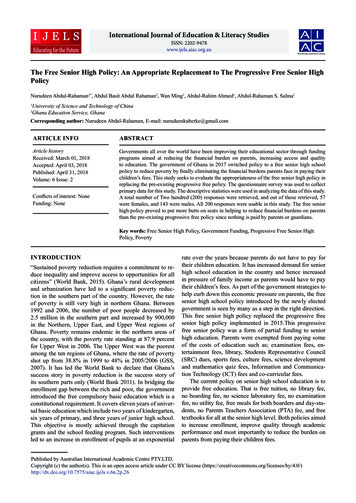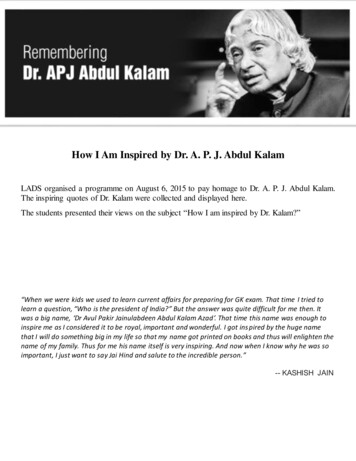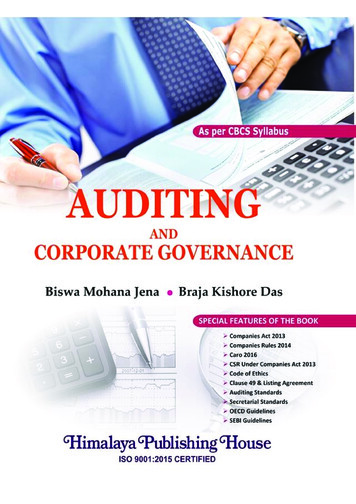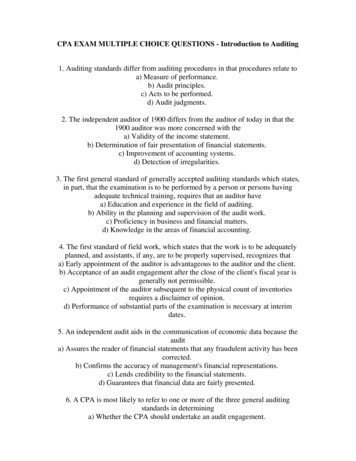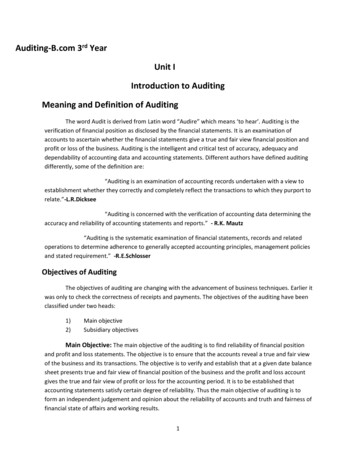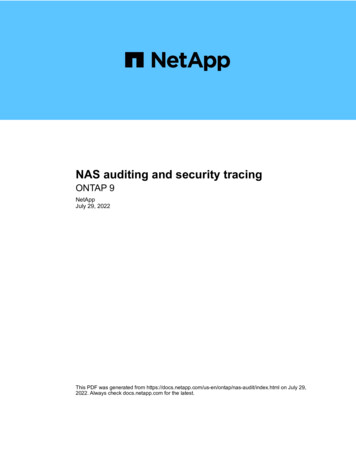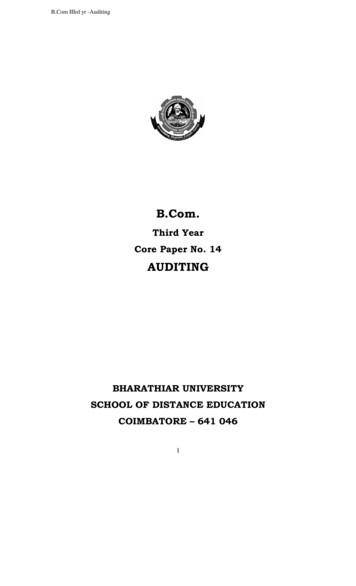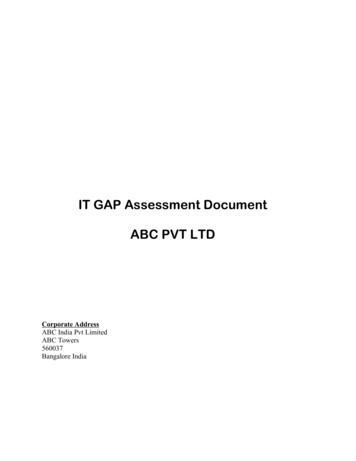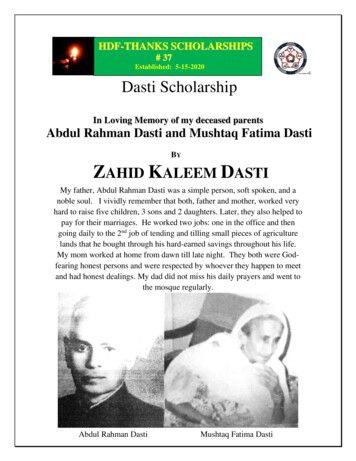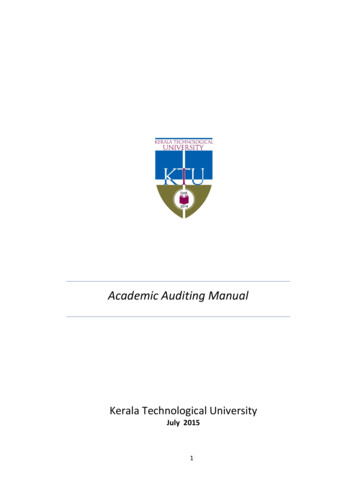
Transcription
Academic Auditing ManualKerala Technological UniversityJuly 20151
CONTENTS1.0INTRODUCTION . 32.0OBJECTIVES OF ACADEMIC AUDITING: . 33.0COURSE DELIVERY . 43.1Lecture Based Courses . 43.2Practical Courses . 53.3Major Projects / Mini Projects . 63.4Seminar . 63.5Design Project . 73.6Comprehensive Examination . 73.7Delivery of P/F course . . 74.0CO-CURRICULAR ACTIVITIES AND EXTRA CURRICULAR ACTIVITIES . 85.0DISCIPLINE & ACADEMIC AMBIENCE . 86.0DUTIES AND RESPONSIBILITIES OF FACULTY MEMBERS . 96.1Academic Activities . 96.2Research & Consultancy . 106.3Administration . 106.4Extension Activities . 107.0CLASS/COURSE COMMITTEES . 118.0STRUCTURE & FUNCTIONING OF THE ACADEMIC AUDITING SYSTEM . 118.1Structure . 128.2Auditing procedures . 129.0DOCUMENTS TO BE PRODUCED FOR AUDIT . 1310.0 COURSE FILE . 142
ACADEMIC AUDITING1.0INTRODUCTIONThe process of Academic Auditing intends to monitor and enhance the quality of technicaleducation through proper guidelines for both teaching faculty and students, so as to ensurequalified engineers/researchers passing out from Engineering Institutions, affiliated to theKerala Technological University (KTU).For proper functioning of academics in an educational institution and to quantify the effortsdispensed by the faculty and students, some assessment components have been designed.These include the assessment of course delivery, as per the curriculum and syllabus of KTU, theco-curricular and extra-curricular activities of students, overall discipline and the academicfunctioning of the Institution, delivery of the duties and responsibilities of faculty members andmonitoring of the class , progress of courses, internal assessment, student welfare andgrievances.This document is envisioned to elaborate the process of academic auditing, which can aid theengineering institution / faculty/ student for success in the Engineering Education arena. Itpresents the objectives of academic auditing, the process of internal and external evaluation ofcourses, major/mini projects, seminars, delivery of P/F courses , overall discipline and academicfunctioning of the institution, duties and responsibilities of faculty members, Research andconsultancy and class/course committees2.0OBJECTIVES OF ACADEMIC AUDITING:(i)To ensure academic accountability.(ii)To define quality of each component of the functionalities and to ensure quality oftechnical education throughout the system.(iii) To safeguard functionalities of technical education.3
(iv) To define effectiveness of teaching – learning process and to devise methodology toconfirm maximum output from faculty members as well as students.3.0COURSE DELIVERYThe B.Tech/M.Tech Programme is administered as a combination of Theory and Practicalcourses, seminars, mini projects and projects related to the area of specialization. There arePass/ Fail courses for B.Tech programme which are aimed as a link between society andthemselves through NSS/ NCC/ Physical Education activities.3.1Lecture Based CoursesThe faculty shall introduce the course(pre-requisite, learning objectives and outcome of thecourse) briefly, on the first day of instruction so as to give an idea of what the course can impartto the students and its importance and relation to the area of specialization. The course planshall be entered in the course diary which would come as part of the course file. The facultyshall try their best to stick to the course plan. The process will be monitored by the InternalAudit Cell (IAC). Based on the performance of the students in the internal tests, remedialmeasures in the form of extra classes/remedial classes shall be conducted.3.1.1 Internal EvaluationTUTORIALS/ASSIGNMENTS/MINI PROJECTSEnsure quantum and quality of assignments/tutorials/miniprojectsCLASS TESTSEnsure quality of question papers - quality of evaluation - Uniform distribution of questionsfrom the portions covered as per the course plan. Two tests of one hour duration aremandatory.4
AWARDING OF SESSIONAL MARKSBased on the performance of students in class test and assignments, sessional marks shall beawarded as perKTURegulations. Practical classes have only internal evaluation.3.2Practical CoursesPractical Instruction manual shall be prepared with theory, procedure, flow charts, equations,tables, model graphs, expected results to be obtained and shall be revised based on changes inthe course content.The first class shall be the introduction to the lab, brief explanation of pre-requisite, learningobjectives and outcome, rules and regulations of the lab, cycle of experiments, the expectedstudent attitude and responsibility towards completion of experiments, the experiences theygain towards the end of the lab and division of student batches.The students shall be instructed to come prepared for the practicalclasses, after going throughthe theoretical and practical aspects of the experiment; along with lab record, graph paper,drawing instruments etc. The student has to complete the experiment, perform necessarycalculations / programmes / graphs plotting, inferring the results etc. and submit the labrecordsfor getting endorsed by the faculty in charge in the class itself. A viva(1 or 2 questions) on theday’s experiment shall be conducted along with the endorsement of the faculty to assess theperformance of the student. Marks are to be awarded for lab records/output and viva in eachpractical class, which shall be added up to award internal assessment marks.Conduct ofminimum number of experiments as specified in the syllabus is mandatory.After all the practical classes are over, a finalwritten test consisting of objective type/writtentest and practical test shall be conducted by the faculty.5
3.3ProjectsB.Tech -Identification of students’ batches (with maximum of 4 students in a batch), broadareas of projects, guides etc. shall be completed within one week after the commencement ofthe classes. The attendance of the student in the institution / the external work place shall bemaintained by the internal / external supervisor. The day to day activities of the student shallbe endorsed weekly. Project evaluations shall be done in twophases –Mid-term and end term.The presentation using ICT in limited slides giving salient points on problem definition,literature survey/review, methodology,design & fabrication, computational analysis, statisticalanalysis, results, discussion, conclusions and bibliography is mandatory for evaluation.Evaluation shall be based on the abovefactors. Conference paper / journal paper based onproject shall be given added credits. Interdisciplinary projects, shall be encouraged. Evaluationscheme for final semester project is as follows.Two progress assessments: 20% by the faculty supervisor(s)Final project report: 30% by the Assessment BoardProject presentation & Viva : 50% by the Assessment Board.M.Tech -Project work is spread over the third and fourth semesters. Project work is tobeevaluated both in the third and the fourth semesters. Based on these evaluations the grade isfinalised only in the fourth semester. See the ORDINANCE for M.Tech for the evaluationprocedure.3.4SeminarPresentation - seminar on a topic of current relevance/emerging trends related to the disciplinewith prior approval of faculty shall be presented. The seminar is to be of 20 minutes durationwith another 5 minutes given for questions and answers. The seminar report shall be preparedin the specific format as specified by the Institution. Evaluations shall be based on the style ofpresentation, technical context, adequacy of reference, depth of knowledge and overall quality.Distribution of marks shall be as follows.Marks for the report: 30%6
Presentation: 40%Ability to answer questions on the topic: 30%3.5 Design Project (for B.Tech programme)Each student or a group of students has to take up a design project. The project topic could bearrived at in consultation with a faculty member in the department. The Evaluation of theproject is to be done in two stages. Two project progress evaluations each carrying 20 marksand a final report evaluation and presentation of the project for 60 marks. The projectsupervisor and two other faculty members from the same or any other department, nominatedby the Head of the Department form the evaluation board.3.6Comprehensive Examination (for B.Tech programme)This examination consists of two parts. Part one a written test and the other an oral one.The written examination shall be objective type of 1 hour duration and shall have 50 marks andis to be conducted by the concerned department. Chairman of the oral examination board shallbe a senior faculty in the department and the members include two other faculty members ofthe department and an external expert from another academic institute or an industry. Oralexamination shall carry 50 marks. Comprehensive examination may be conducted any timeduring the 6th semester with sufficient notice given to the students.3.7Delivery of P/F course (for B.Tech programme)Each B.Tech student shall compulsorily participate in any one of NSS / NCC / Physical Educationactivities for the required duration. The activities shall be planned without affecting theacademics of the students; preferably during weekends and holidays. The students shall begiven points for participation in activities as per the guidelines in the B.Tech ordinance and shall7
be awarded credits for the P/F courses.The auditor shall verify that facility is provided for suchactivities and points are awarded as per norms.4.0CO-CURRICULAR ACTIVITIES AND EXTRA CURRICULAR ACTIVITIESEncourage the extra-curricular and co-curricular activities of the students, participation in theactivities of Department Associations, Professional bodies, Students’ Senate/Union, functionscoordinated by the institution etc. Conduct programmes / lectures that are beneficial to thestudents for the development of Professionalism.5.0DISCIPLINE & ACADEMIC AMBIENCEDiscipline & academic ambience shall be maintained in the campus. Any complaints orgrievances of the students shall be addressed and solved at the earliest.Functioning of the following bodies in the institution are necessary for overall discipline andgood academic ambience.i. College councilii. Academic Counciliii. Career Guidance & Placement Unitiv. Continuing Education Cellv. Industry – Institute – Interaction Cellvi. Research & Consultancy Cellvii. Central Computing Facilityviii. Library Councilix. Community Service Cellx. Professional bodiesxi. ECO clubsxii. Students Senate/Unionxiii. Student’s Grievancesredressal Committeexiv. Student’s Welfare Committee8
xv. Counselling Centrexvi. Ethics Committeexvii. Antiragging squad and Antiragging committeexviii. Hostel committeexix. Bus/Transportation committeexx. Sports committeexxi. Women’s forumxxii. Staff Welfare Committeexxiii. PTAxxiv. Canteen committeexxv. Alumni Association6.0DUTIES AND RESPONSIBILITIES OF FACULTY MEMBERS6.11.Academic Activities2.Research & Consultancy3.Administration4.Extension ActivitiesAcademic Activities Class room instruction Laboratory Instruction Curriculum development Developing learning resource material and laboratory development Students’ assessment & evaluation including examination work of university Organization of co-curricular & extra-curricular activities Student guidance & counselling Continuing Education activities Knowledge updating - Generating new knowledge, dissemination through books,seminars, publications9
Self-development through upgrading qualification, experience and professionalactivities.6.2Research & Consultancy Research & Development activities and research guidance Sponsored Projects Consultancy & Testing Services Promotion of Industry Institution interaction and R & D.6.3Administration Academic and Administrative Management of the Institution Policy planning, monitoring & evaluation and promotional activities (departmental &institutional level), Design and development of new programmes Preparation of Project proposals for funding areas of R&D work, lab development,modernization etc. Development, administration and management of institutional facilities Monitoring and evaluation of academic and research activities Participation in policy planning activities (Regional/State/National/ International levels), Helping mobilization of resources of the Institution Staff development activities Maintain accountability, conduct performance appraisal.6.4Extension Activities Interaction with industry & society Participation in community services Providing R & D support and consultancy services to industry and other user agencies Providing non-formal modes of education for the benefit of the community Promotion of entrepreneurship and job creation10
7.0 Dissemination of knowledge Providing technical support in areas of social relevanceCLASS/COURSE COMMITTEESClass Committee for a B.Tech/M.Tech class shall comprise of a senior faculty who doesnothandle any course for the class as Chairman, faculty Advisor of the class and all the facultymembers engaging different courses of the class and 2 student representatives from the class –one at a comparatively high academic level and the other at an average level. The facultyadvisor concerned shall be the Convener of this committee.Course Committee – In the case of common courses for B.Tech (such as Mathematics, Physics,Chemistry etc.) a course committee has to be constituted by the Principal for each course. Thechairman shall be a senior faculty member not offering the course.All faculty members handlingthe course for various classes and 4 student representatives among different classes shall bemembers. FunctionsThe course committees and class committees shall meet at least thrice in a semester- the firstat the beginning of the semester, the second and third after the first and the second internaltests respectively. These committees shall monitor the conduct of the course, adherence to thecourse plan, time schedule, completion of the syllabus, standards of internal tests andevaluation process. These committees will also address the difficulties faced by students andwill take suitable remedial actions, if required. At the end of the semester, the committeeshould meet without the student representatives to review the conduct of the course andfinalise the internal assessment marks and approve them.11
8.0STRUCTURE & FUNCTIONING OF THE ACADEMIC AUDITING SYSTEMThe Academic Auditing system comprises of two bodies; the Internal Audit Cell (IAC) at theInstitution level and the External Auditor at the University Level. The Internal Audit Cell, willfunction as a body assisting the External Auditor.8.1StructureInternal Audit Cell (IAC):is a group of faculty members having representation from eachdepartment. The members of the IAC shall be nominated by the Head of the Institution, onefrom each department, in the cadre of Professor or Associate Professor, including arts & sciencedepartments.A senior member of IAC shall be its coordinator. The term of IAC shall be oneacademic year. IAC shall conduct internal academic audit and produce the required documentsand records to the External Auditor on demand. IAC is also responsible for uploadingmonthlyreport, annual report and any other datarequired to the external auditor and/or KTU.External Auditor:The external auditor, appointed by the University,will be a provenacademician, preferably retired Professor/ senior Professor or Associate Professorpreferablyfrom Government/Aided/Govt Sponsored Self Financing Engineering colleges.Theexternal auditor shall visit their allotted educational institution(s) three times in a semester andas and when required by the University.The external auditor shall prepare an online report and forward it to the Principal of theInstitution and tothe KTU. The Principal shall give his response on the observations made by theauditor and shall submit to the KTU within one week.8.2Audit proceduresThe Principal of the college shall ensure that the records/documents listed in section 9.0 aremaintained and accessible for both internal and external auditors.The IAC coordinator shall ensure that data are uploaded / mailed, as the case may be, withinthe stipulated time to external auditor/KTU. IAC members should conduct internal audit (inter –12
departmental) of the institution,nstitution, in academic matters. A group of three members of IAC, asdecided by the IAC Coordinator shall verify the details of a department; but, a member from theconcerned department shall not be a member in the internal audit group.The externall auditor will visit the college, verify the documents and may interview the faculty,staff and students. The auditor shall susubmit an online report for each class after the audit.Fig. 1 shows the actions of Academic Auditing.Academic AuditingProceduresExternal Auditor appointed by theUniversityInternal Audit Cell (IAC)OverseeMonitor allAcademicactivitiesincludinginternalevaluations andexaminationsMonthlyReport/DatauploadingAssist externalauditorConduct audit & SubmitReport to the University &the CollegeFig. 1 Academic Auditing Procedure9.0DOCUMENTS TO BE PRODUCED FOR AUDITEach affiliated institution has to maintain the details of various academic activities in the formof documents given below. TheseThe documents shall be made available to the external auditor asand when required.13
1. Class Time Table& Faculty Time Table2. Students Roll List3. Students Batch List ( for practical courses, projects& elective courses)4. Minutes of course/class committees5. Course Diary for all the courses including practical, seminar, project etc.6. Course File7. Tutorial Log book8. Equipment Log register used in Laboratories9. Consolidated Attendance statement of students10. Consolidated statement of marks of internal tests11. Seminar presentation details12. Project (Mini project/Design project/Final semester project) progress reviewreports13. Register of internal evaluation marks14. Student Activities Log Book( for B.Tech programme only)15. Log book for summer and contact courses16. Register of Remedial/Bridge/Language Lab classes17. Minutes of Discipline, Academic and Student Welfare Committees18. Consolidated semester grades of students19. Result Analysis10.0COURSE DIARY AND COURSE FILE10.1 Course DiaryA course diary is to be maintained by each staff of the department for each course handled byhim/her. Course Diary becomes a part of the course file10.1.1 Course Diary for Lecture Based CoursesIt shall contain Time Schedule of classes Syllabus Course plan14
Year Calendar Details of assignments, tutorials Attendance of students Marks awarded for assignments, internal exams etc Internal evaluation marks Topics covered and mode of instruction in each class Extra classes engaged Learning materials providedA sample of course diary is given in Appendix 110.1.2 Course Diary for Practical CoursesIt shall contain details such as Time Schedule of class Syllabus Course Plan Attendance of Students Practical Evaluation Sheet Marks for class viva Marks for Final test Internal Evaluation marks10.1.3 Course Diary for Seminar/ProjectsIt shall contain Time Schedule of class Attendance of students Seminar/Project presentation details (Name of student presented, Time slot,Seminar/Project Topic)15
Seminar/Project evaluation details10.2 Course File10.2.1 Course file for Lecture based courses:One course file each for each theory course is tobe maintained in the Department for each semester. The Course file shall containthefollowingdocuments:(1) Course diaries of all faculty who have engaged the course (2) question paper andscheme of evaluation for 1st and 2nd internal exam, all assignments given, Makeup / Re-Test given (if any) etc. (3) Previous Year University question papers, (4)Sample answer sheets (at least one excellent, one good and one marginal pass) forall internal exams and assignments given, (5) sample tutorial sheets, quiz or anyother assessment done, (6) all answer sheets of Make-up / Re-Test given (if any) (7)Mapping of Course outcome and Programme outcomes (POs) (8) Industrialrelevance of the course, if any10.2.2Course File for Practical courses: One course file each for each Practical course has to bemaintained in the Department for each semester. Course file shall contain the followingdocuments:(1) Course Diaryof all batches (2) Question paper and scheme of evaluation forLab internal exam, Make-up / Re-Test given (if any) etc., (3) Sample answersheets (at least one excellent, one good and one marginal pass) for Lab internalexam ) (7) Mapping of Course outcome and Programme outcomes (POs) (8)Industrial relevance of the course, if any10.2.3 Course File for Seminar/ProjectsIt shall contain (i) Course Diary (ii) Consolidated List of Seminar/Project topics with PO mappingand industrial relevance, if any16
ACADEMIC AUDITING 1.0 INTRODUCTION The process of Academic Auditing intends to monitor and enhance the quality of technical education through proper guidelines for both teaching faculty and students, so as to ensure qualified engineers/researchers passing out from Engineering Institutions, affiliated to the Kerala Technological University (KTU).
